Psychotropic Medications: Controversy, Benefits, Challenges and Nurses
VerifiedAdded on 2022/09/09
|12
|3243
|17
Essay
AI Summary
This essay delves into the ongoing debate surrounding the use of psychotropic medications to manage behaviors and symptoms in individuals with mental illness. It explores the controversy, presenting arguments from both proponents and opponents, examining the benefits such as symptom alleviation and relapse prevention, alongside drawbacks including side effects like weight gain and potential for violence, and the challenges faced by mental health nurses in administering these medications, including patient attitudes, and exposure to aggressive behavior. The essay cites various studies and research findings to support its claims, concluding that while psychotropic medications offer certain advantages, the potential side effects and challenges necessitate careful consideration and management.
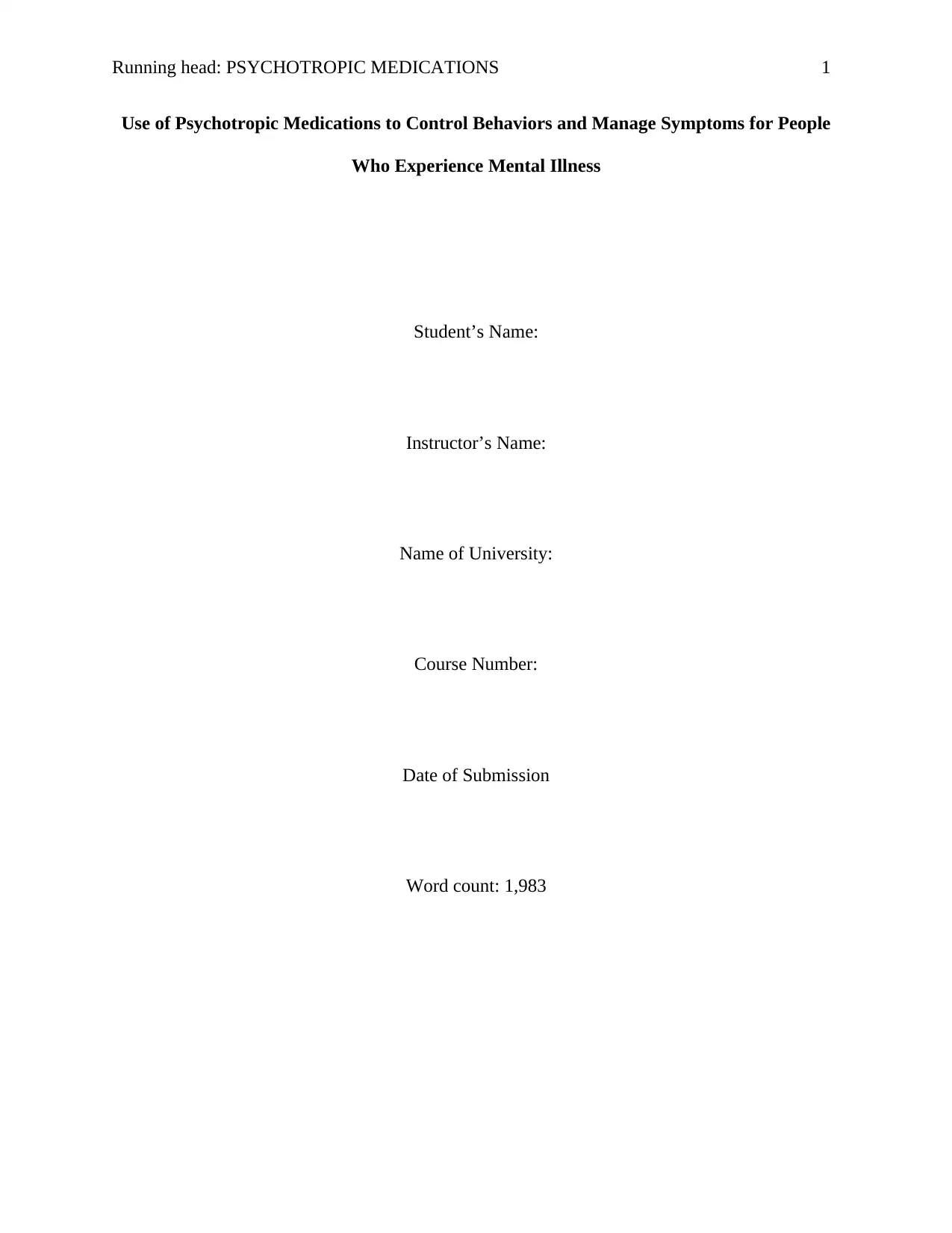
Running head: PSYCHOTROPIC MEDICATIONS 1
Use of Psychotropic Medications to Control Behaviors and Manage Symptoms for People
Who Experience Mental Illness
Student’s Name:
Instructor’s Name:
Name of University:
Course Number:
Date of Submission
Word count: 1,983
Use of Psychotropic Medications to Control Behaviors and Manage Symptoms for People
Who Experience Mental Illness
Student’s Name:
Instructor’s Name:
Name of University:
Course Number:
Date of Submission
Word count: 1,983
Paraphrase This Document
Need a fresh take? Get an instant paraphrase of this document with our AI Paraphraser
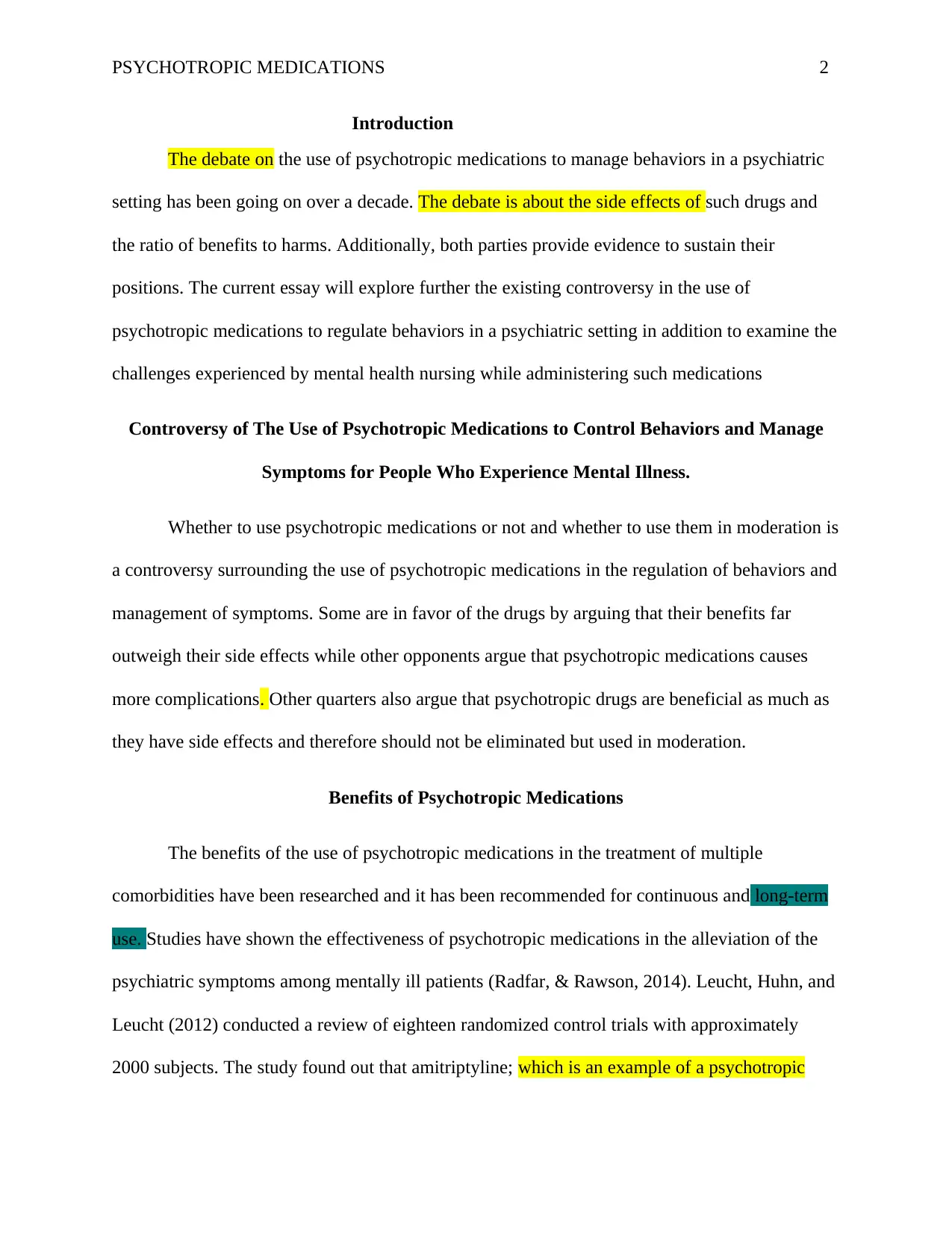
PSYCHOTROPIC MEDICATIONS 2
Introduction
The debate on the use of psychotropic medications to manage behaviors in a psychiatric
setting has been going on over a decade. The debate is about the side effects of such drugs and
the ratio of benefits to harms. Additionally, both parties provide evidence to sustain their
positions. The current essay will explore further the existing controversy in the use of
psychotropic medications to regulate behaviors in a psychiatric setting in addition to examine the
challenges experienced by mental health nursing while administering such medications
Controversy of The Use of Psychotropic Medications to Control Behaviors and Manage
Symptoms for People Who Experience Mental Illness.
Whether to use psychotropic medications or not and whether to use them in moderation is
a controversy surrounding the use of psychotropic medications in the regulation of behaviors and
management of symptoms. Some are in favor of the drugs by arguing that their benefits far
outweigh their side effects while other opponents argue that psychotropic medications causes
more complications. Other quarters also argue that psychotropic drugs are beneficial as much as
they have side effects and therefore should not be eliminated but used in moderation.
Benefits of Psychotropic Medications
The benefits of the use of psychotropic medications in the treatment of multiple
comorbidities have been researched and it has been recommended for continuous and long-term
use. Studies have shown the effectiveness of psychotropic medications in the alleviation of the
psychiatric symptoms among mentally ill patients (Radfar, & Rawson, 2014). Leucht, Huhn, and
Leucht (2012) conducted a review of eighteen randomized control trials with approximately
2000 subjects. The study found out that amitriptyline; which is an example of a psychotropic
Introduction
The debate on the use of psychotropic medications to manage behaviors in a psychiatric
setting has been going on over a decade. The debate is about the side effects of such drugs and
the ratio of benefits to harms. Additionally, both parties provide evidence to sustain their
positions. The current essay will explore further the existing controversy in the use of
psychotropic medications to regulate behaviors in a psychiatric setting in addition to examine the
challenges experienced by mental health nursing while administering such medications
Controversy of The Use of Psychotropic Medications to Control Behaviors and Manage
Symptoms for People Who Experience Mental Illness.
Whether to use psychotropic medications or not and whether to use them in moderation is
a controversy surrounding the use of psychotropic medications in the regulation of behaviors and
management of symptoms. Some are in favor of the drugs by arguing that their benefits far
outweigh their side effects while other opponents argue that psychotropic medications causes
more complications. Other quarters also argue that psychotropic drugs are beneficial as much as
they have side effects and therefore should not be eliminated but used in moderation.
Benefits of Psychotropic Medications
The benefits of the use of psychotropic medications in the treatment of multiple
comorbidities have been researched and it has been recommended for continuous and long-term
use. Studies have shown the effectiveness of psychotropic medications in the alleviation of the
psychiatric symptoms among mentally ill patients (Radfar, & Rawson, 2014). Leucht, Huhn, and
Leucht (2012) conducted a review of eighteen randomized control trials with approximately
2000 subjects. The study found out that amitriptyline; which is an example of a psychotropic
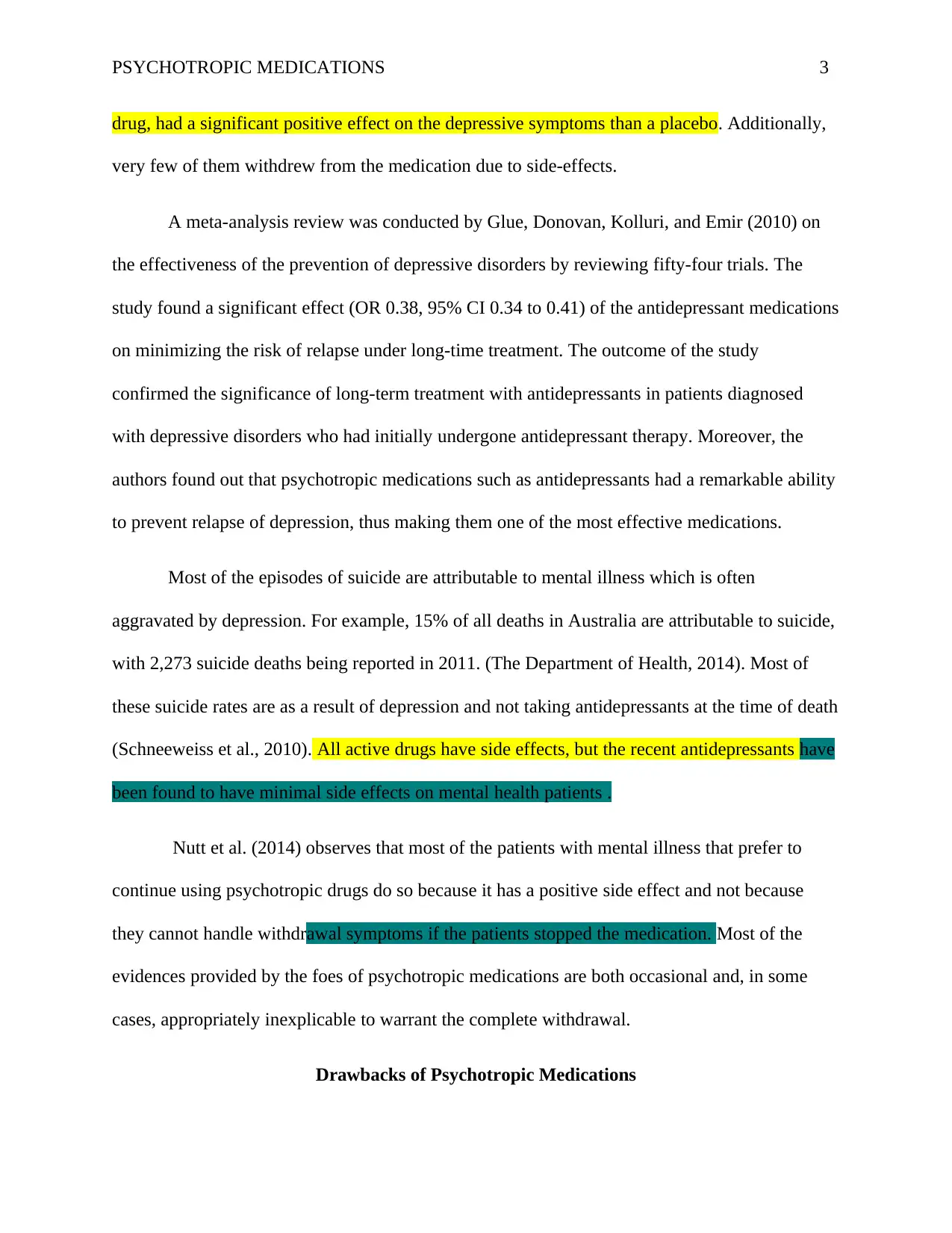
PSYCHOTROPIC MEDICATIONS 3
drug, had a significant positive effect on the depressive symptoms than a placebo. Additionally,
very few of them withdrew from the medication due to side-effects.
A meta-analysis review was conducted by Glue, Donovan, Kolluri, and Emir (2010) on
the effectiveness of the prevention of depressive disorders by reviewing fifty-four trials. The
study found a significant effect (OR 0.38, 95% CI 0.34 to 0.41) of the antidepressant medications
on minimizing the risk of relapse under long-time treatment. The outcome of the study
confirmed the significance of long-term treatment with antidepressants in patients diagnosed
with depressive disorders who had initially undergone antidepressant therapy. Moreover, the
authors found out that psychotropic medications such as antidepressants had a remarkable ability
to prevent relapse of depression, thus making them one of the most effective medications.
Most of the episodes of suicide are attributable to mental illness which is often
aggravated by depression. For example, 15% of all deaths in Australia are attributable to suicide,
with 2,273 suicide deaths being reported in 2011. (The Department of Health, 2014). Most of
these suicide rates are as a result of depression and not taking antidepressants at the time of death
(Schneeweiss et al., 2010). All active drugs have side effects, but the recent antidepressants have
been found to have minimal side effects on mental health patients .
Nutt et al. (2014) observes that most of the patients with mental illness that prefer to
continue using psychotropic drugs do so because it has a positive side effect and not because
they cannot handle withdrawal symptoms if the patients stopped the medication. Most of the
evidences provided by the foes of psychotropic medications are both occasional and, in some
cases, appropriately inexplicable to warrant the complete withdrawal.
Drawbacks of Psychotropic Medications
drug, had a significant positive effect on the depressive symptoms than a placebo. Additionally,
very few of them withdrew from the medication due to side-effects.
A meta-analysis review was conducted by Glue, Donovan, Kolluri, and Emir (2010) on
the effectiveness of the prevention of depressive disorders by reviewing fifty-four trials. The
study found a significant effect (OR 0.38, 95% CI 0.34 to 0.41) of the antidepressant medications
on minimizing the risk of relapse under long-time treatment. The outcome of the study
confirmed the significance of long-term treatment with antidepressants in patients diagnosed
with depressive disorders who had initially undergone antidepressant therapy. Moreover, the
authors found out that psychotropic medications such as antidepressants had a remarkable ability
to prevent relapse of depression, thus making them one of the most effective medications.
Most of the episodes of suicide are attributable to mental illness which is often
aggravated by depression. For example, 15% of all deaths in Australia are attributable to suicide,
with 2,273 suicide deaths being reported in 2011. (The Department of Health, 2014). Most of
these suicide rates are as a result of depression and not taking antidepressants at the time of death
(Schneeweiss et al., 2010). All active drugs have side effects, but the recent antidepressants have
been found to have minimal side effects on mental health patients .
Nutt et al. (2014) observes that most of the patients with mental illness that prefer to
continue using psychotropic drugs do so because it has a positive side effect and not because
they cannot handle withdrawal symptoms if the patients stopped the medication. Most of the
evidences provided by the foes of psychotropic medications are both occasional and, in some
cases, appropriately inexplicable to warrant the complete withdrawal.
Drawbacks of Psychotropic Medications
⊘ This is a preview!⊘
Do you want full access?
Subscribe today to unlock all pages.

Trusted by 1+ million students worldwide
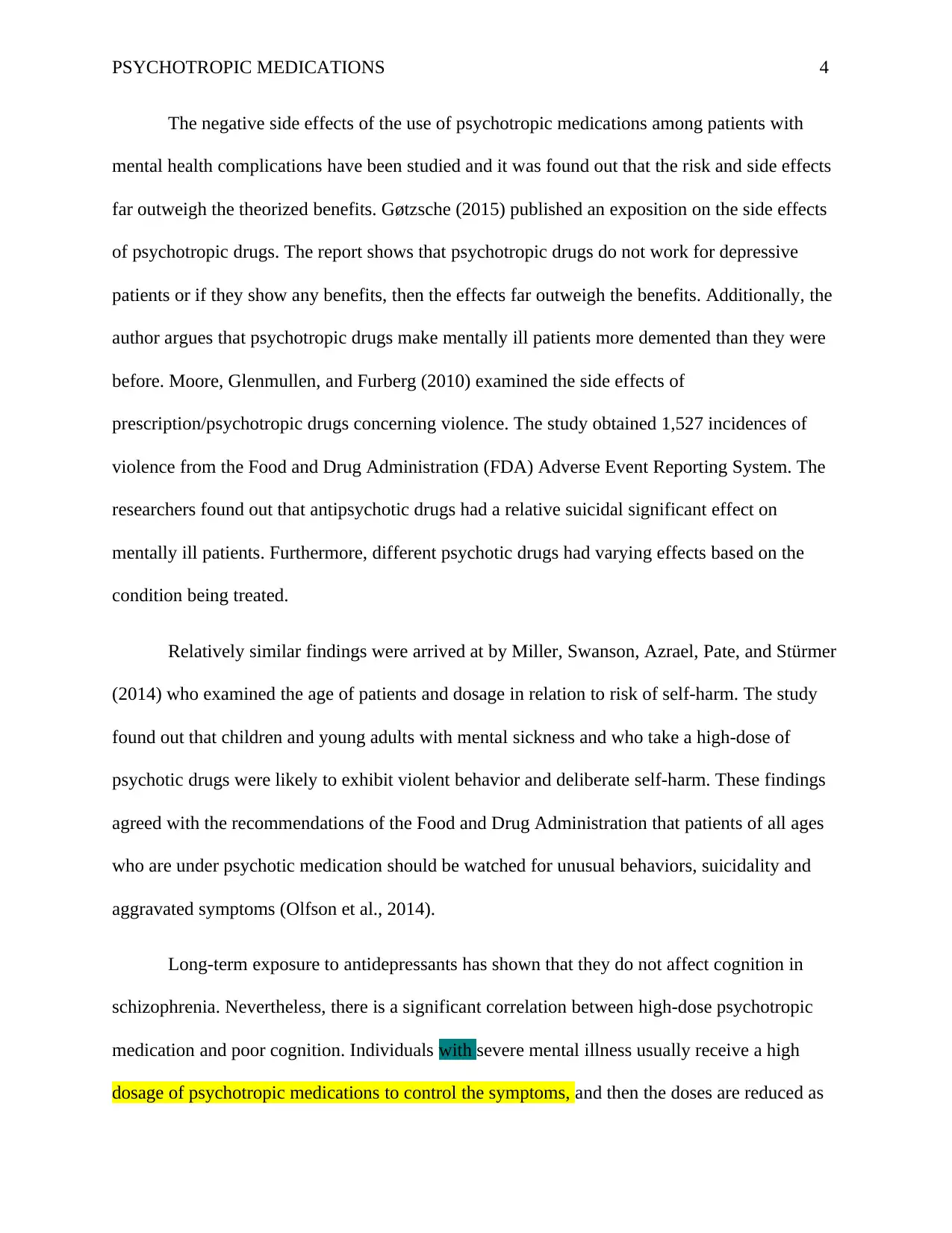
PSYCHOTROPIC MEDICATIONS 4
The negative side effects of the use of psychotropic medications among patients with
mental health complications have been studied and it was found out that the risk and side effects
far outweigh the theorized benefits. Gøtzsche (2015) published an exposition on the side effects
of psychotropic drugs. The report shows that psychotropic drugs do not work for depressive
patients or if they show any benefits, then the effects far outweigh the benefits. Additionally, the
author argues that psychotropic drugs make mentally ill patients more demented than they were
before. Moore, Glenmullen, and Furberg (2010) examined the side effects of
prescription/psychotropic drugs concerning violence. The study obtained 1,527 incidences of
violence from the Food and Drug Administration (FDA) Adverse Event Reporting System. The
researchers found out that antipsychotic drugs had a relative suicidal significant effect on
mentally ill patients. Furthermore, different psychotic drugs had varying effects based on the
condition being treated.
Relatively similar findings were arrived at by Miller, Swanson, Azrael, Pate, and Stürmer
(2014) who examined the age of patients and dosage in relation to risk of self-harm. The study
found out that children and young adults with mental sickness and who take a high-dose of
psychotic drugs were likely to exhibit violent behavior and deliberate self-harm. These findings
agreed with the recommendations of the Food and Drug Administration that patients of all ages
who are under psychotic medication should be watched for unusual behaviors, suicidality and
aggravated symptoms (Olfson et al., 2014).
Long-term exposure to antidepressants has shown that they do not affect cognition in
schizophrenia. Nevertheless, there is a significant correlation between high-dose psychotropic
medication and poor cognition. Individuals with severe mental illness usually receive a high
dosage of psychotropic medications to control the symptoms, and then the doses are reduced as
The negative side effects of the use of psychotropic medications among patients with
mental health complications have been studied and it was found out that the risk and side effects
far outweigh the theorized benefits. Gøtzsche (2015) published an exposition on the side effects
of psychotropic drugs. The report shows that psychotropic drugs do not work for depressive
patients or if they show any benefits, then the effects far outweigh the benefits. Additionally, the
author argues that psychotropic drugs make mentally ill patients more demented than they were
before. Moore, Glenmullen, and Furberg (2010) examined the side effects of
prescription/psychotropic drugs concerning violence. The study obtained 1,527 incidences of
violence from the Food and Drug Administration (FDA) Adverse Event Reporting System. The
researchers found out that antipsychotic drugs had a relative suicidal significant effect on
mentally ill patients. Furthermore, different psychotic drugs had varying effects based on the
condition being treated.
Relatively similar findings were arrived at by Miller, Swanson, Azrael, Pate, and Stürmer
(2014) who examined the age of patients and dosage in relation to risk of self-harm. The study
found out that children and young adults with mental sickness and who take a high-dose of
psychotic drugs were likely to exhibit violent behavior and deliberate self-harm. These findings
agreed with the recommendations of the Food and Drug Administration that patients of all ages
who are under psychotic medication should be watched for unusual behaviors, suicidality and
aggravated symptoms (Olfson et al., 2014).
Long-term exposure to antidepressants has shown that they do not affect cognition in
schizophrenia. Nevertheless, there is a significant correlation between high-dose psychotropic
medication and poor cognition. Individuals with severe mental illness usually receive a high
dosage of psychotropic medications to control the symptoms, and then the doses are reduced as
Paraphrase This Document
Need a fresh take? Get an instant paraphrase of this document with our AI Paraphraser
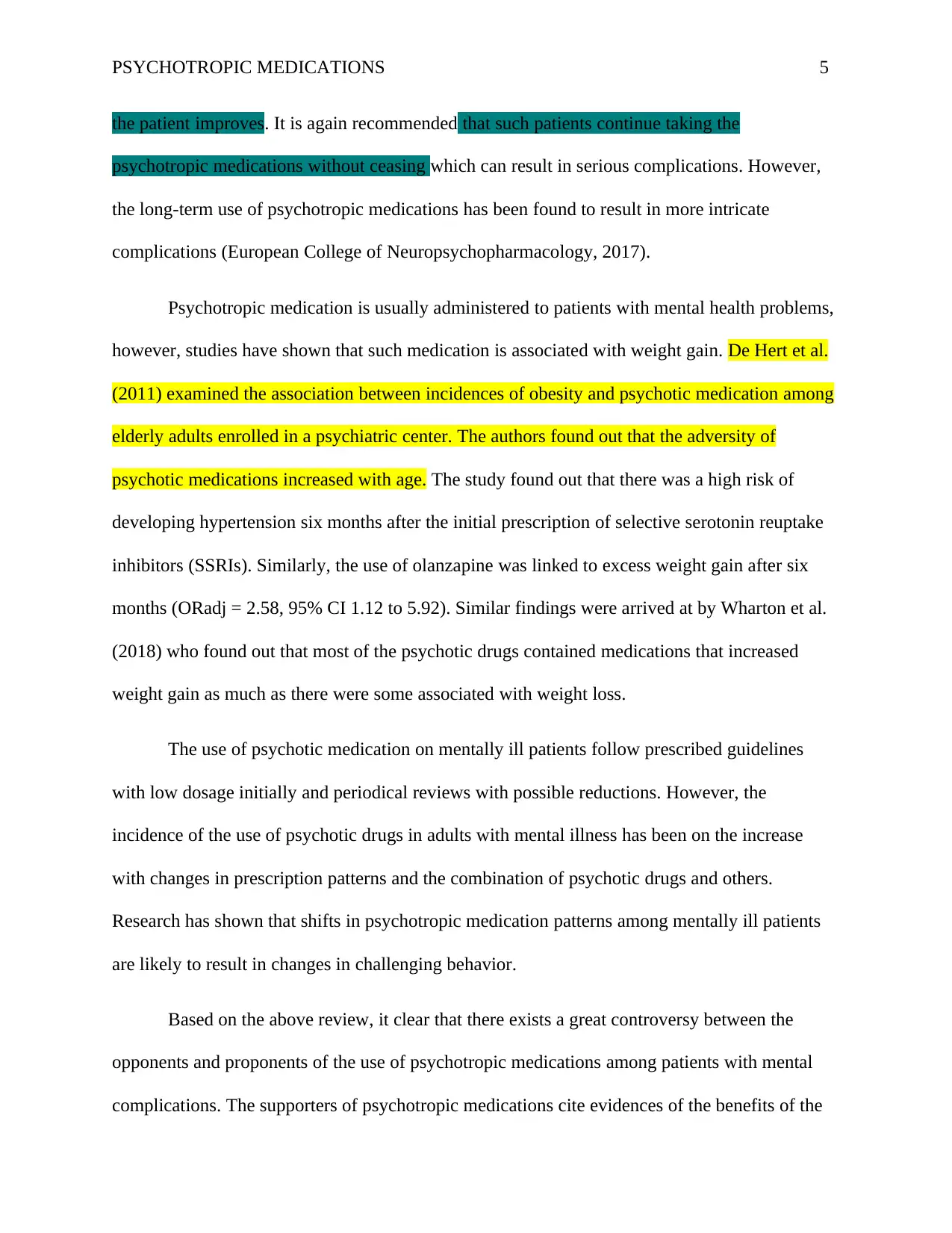
PSYCHOTROPIC MEDICATIONS 5
the patient improves. It is again recommended that such patients continue taking the
psychotropic medications without ceasing which can result in serious complications. However,
the long-term use of psychotropic medications has been found to result in more intricate
complications (European College of Neuropsychopharmacology, 2017).
Psychotropic medication is usually administered to patients with mental health problems,
however, studies have shown that such medication is associated with weight gain. De Hert et al.
(2011) examined the association between incidences of obesity and psychotic medication among
elderly adults enrolled in a psychiatric center. The authors found out that the adversity of
psychotic medications increased with age. The study found out that there was a high risk of
developing hypertension six months after the initial prescription of selective serotonin reuptake
inhibitors (SSRIs). Similarly, the use of olanzapine was linked to excess weight gain after six
months (ORadj = 2.58, 95% CI 1.12 to 5.92). Similar findings were arrived at by Wharton et al.
(2018) who found out that most of the psychotic drugs contained medications that increased
weight gain as much as there were some associated with weight loss.
The use of psychotic medication on mentally ill patients follow prescribed guidelines
with low dosage initially and periodical reviews with possible reductions. However, the
incidence of the use of psychotic drugs in adults with mental illness has been on the increase
with changes in prescription patterns and the combination of psychotic drugs and others.
Research has shown that shifts in psychotropic medication patterns among mentally ill patients
are likely to result in changes in challenging behavior.
Based on the above review, it clear that there exists a great controversy between the
opponents and proponents of the use of psychotropic medications among patients with mental
complications. The supporters of psychotropic medications cite evidences of the benefits of the
the patient improves. It is again recommended that such patients continue taking the
psychotropic medications without ceasing which can result in serious complications. However,
the long-term use of psychotropic medications has been found to result in more intricate
complications (European College of Neuropsychopharmacology, 2017).
Psychotropic medication is usually administered to patients with mental health problems,
however, studies have shown that such medication is associated with weight gain. De Hert et al.
(2011) examined the association between incidences of obesity and psychotic medication among
elderly adults enrolled in a psychiatric center. The authors found out that the adversity of
psychotic medications increased with age. The study found out that there was a high risk of
developing hypertension six months after the initial prescription of selective serotonin reuptake
inhibitors (SSRIs). Similarly, the use of olanzapine was linked to excess weight gain after six
months (ORadj = 2.58, 95% CI 1.12 to 5.92). Similar findings were arrived at by Wharton et al.
(2018) who found out that most of the psychotic drugs contained medications that increased
weight gain as much as there were some associated with weight loss.
The use of psychotic medication on mentally ill patients follow prescribed guidelines
with low dosage initially and periodical reviews with possible reductions. However, the
incidence of the use of psychotic drugs in adults with mental illness has been on the increase
with changes in prescription patterns and the combination of psychotic drugs and others.
Research has shown that shifts in psychotropic medication patterns among mentally ill patients
are likely to result in changes in challenging behavior.
Based on the above review, it clear that there exists a great controversy between the
opponents and proponents of the use of psychotropic medications among patients with mental
complications. The supporters of psychotropic medications cite evidences of the benefits of the
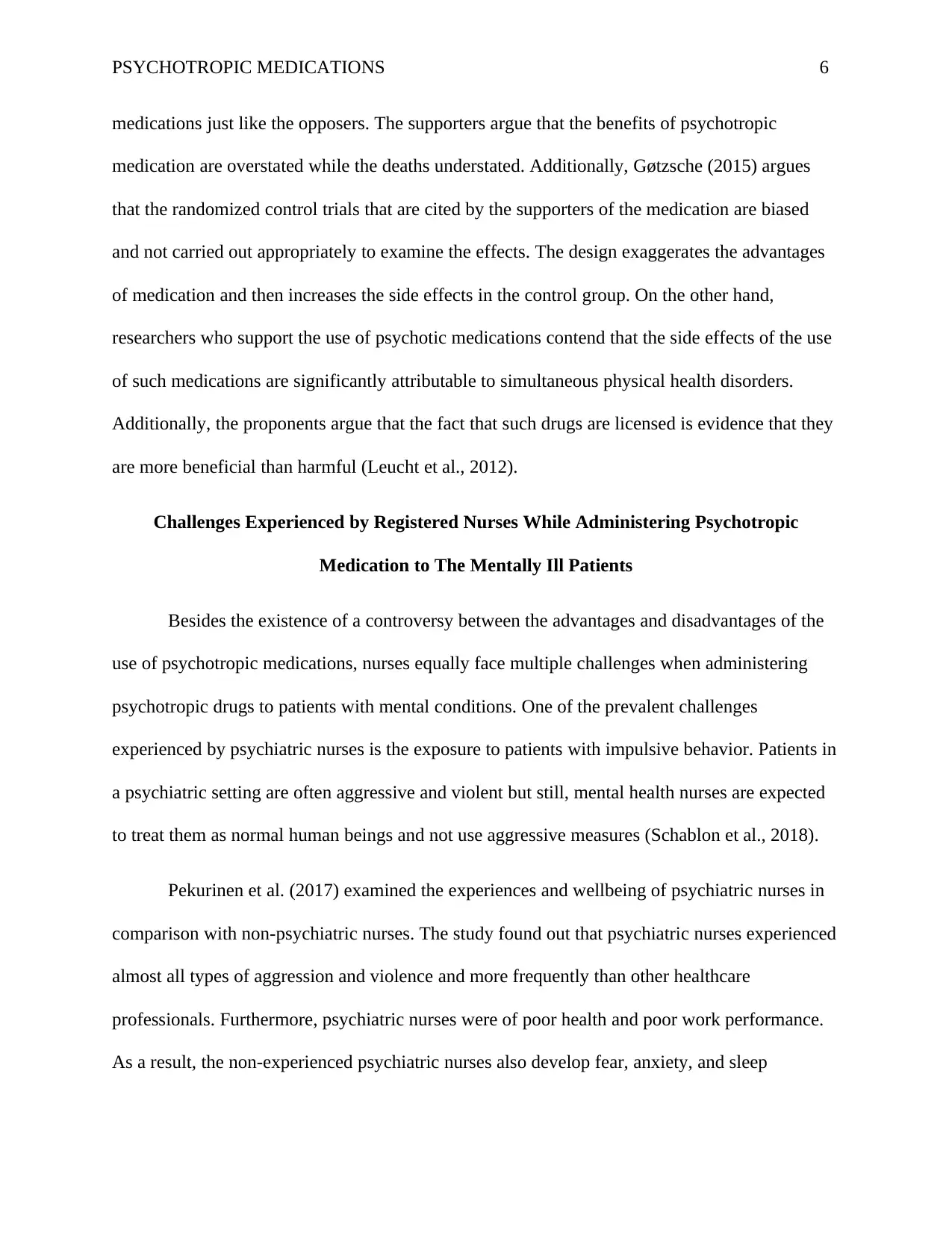
PSYCHOTROPIC MEDICATIONS 6
medications just like the opposers. The supporters argue that the benefits of psychotropic
medication are overstated while the deaths understated. Additionally, Gøtzsche (2015) argues
that the randomized control trials that are cited by the supporters of the medication are biased
and not carried out appropriately to examine the effects. The design exaggerates the advantages
of medication and then increases the side effects in the control group. On the other hand,
researchers who support the use of psychotic medications contend that the side effects of the use
of such medications are significantly attributable to simultaneous physical health disorders.
Additionally, the proponents argue that the fact that such drugs are licensed is evidence that they
are more beneficial than harmful (Leucht et al., 2012).
Challenges Experienced by Registered Nurses While Administering Psychotropic
Medication to The Mentally Ill Patients
Besides the existence of a controversy between the advantages and disadvantages of the
use of psychotropic medications, nurses equally face multiple challenges when administering
psychotropic drugs to patients with mental conditions. One of the prevalent challenges
experienced by psychiatric nurses is the exposure to patients with impulsive behavior. Patients in
a psychiatric setting are often aggressive and violent but still, mental health nurses are expected
to treat them as normal human beings and not use aggressive measures (Schablon et al., 2018).
Pekurinen et al. (2017) examined the experiences and wellbeing of psychiatric nurses in
comparison with non-psychiatric nurses. The study found out that psychiatric nurses experienced
almost all types of aggression and violence and more frequently than other healthcare
professionals. Furthermore, psychiatric nurses were of poor health and poor work performance.
As a result, the non-experienced psychiatric nurses also develop fear, anxiety, and sleep
medications just like the opposers. The supporters argue that the benefits of psychotropic
medication are overstated while the deaths understated. Additionally, Gøtzsche (2015) argues
that the randomized control trials that are cited by the supporters of the medication are biased
and not carried out appropriately to examine the effects. The design exaggerates the advantages
of medication and then increases the side effects in the control group. On the other hand,
researchers who support the use of psychotic medications contend that the side effects of the use
of such medications are significantly attributable to simultaneous physical health disorders.
Additionally, the proponents argue that the fact that such drugs are licensed is evidence that they
are more beneficial than harmful (Leucht et al., 2012).
Challenges Experienced by Registered Nurses While Administering Psychotropic
Medication to The Mentally Ill Patients
Besides the existence of a controversy between the advantages and disadvantages of the
use of psychotropic medications, nurses equally face multiple challenges when administering
psychotropic drugs to patients with mental conditions. One of the prevalent challenges
experienced by psychiatric nurses is the exposure to patients with impulsive behavior. Patients in
a psychiatric setting are often aggressive and violent but still, mental health nurses are expected
to treat them as normal human beings and not use aggressive measures (Schablon et al., 2018).
Pekurinen et al. (2017) examined the experiences and wellbeing of psychiatric nurses in
comparison with non-psychiatric nurses. The study found out that psychiatric nurses experienced
almost all types of aggression and violence and more frequently than other healthcare
professionals. Furthermore, psychiatric nurses were of poor health and poor work performance.
As a result, the non-experienced psychiatric nurses also develop fear, anxiety, and sleep
⊘ This is a preview!⊘
Do you want full access?
Subscribe today to unlock all pages.

Trusted by 1+ million students worldwide
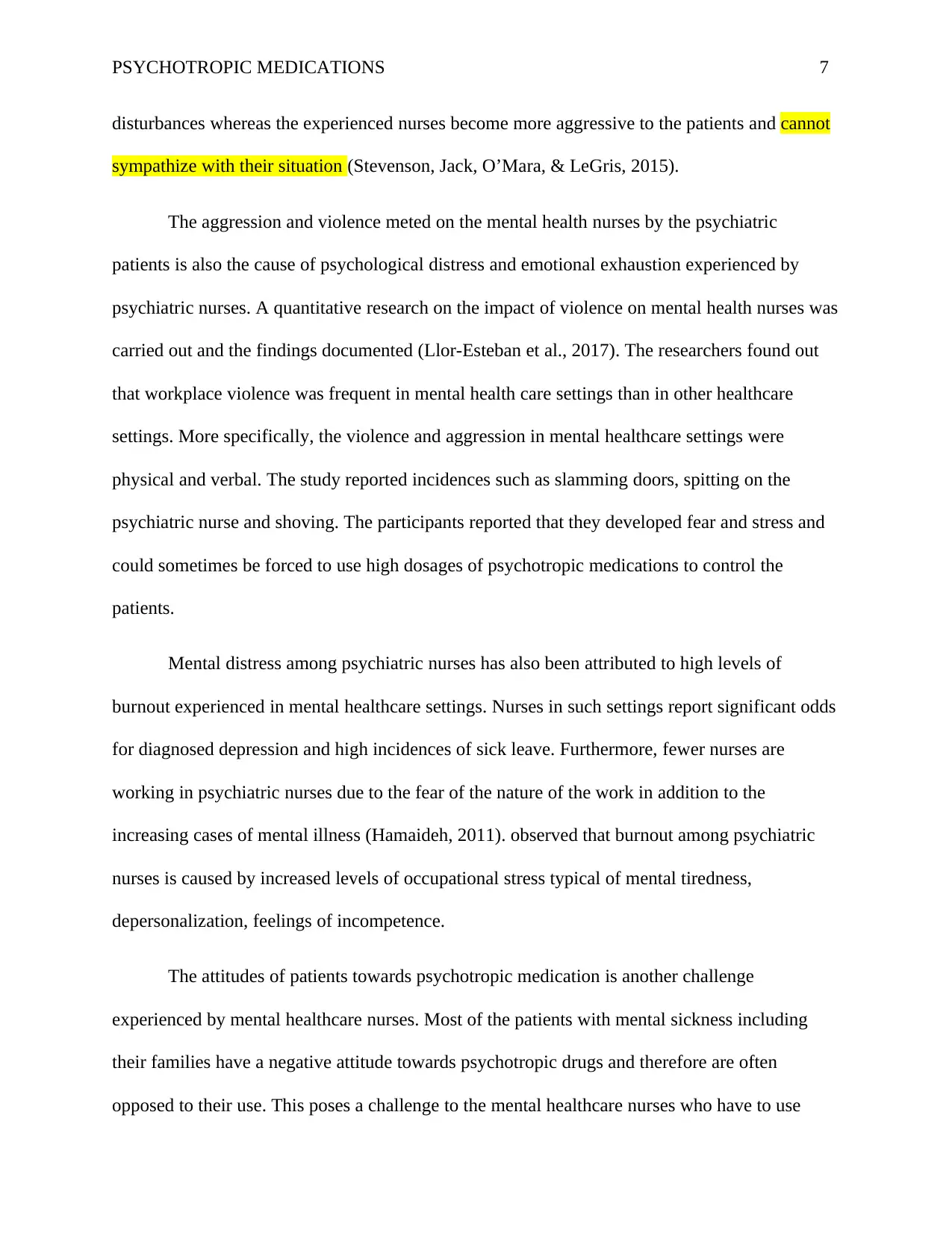
PSYCHOTROPIC MEDICATIONS 7
disturbances whereas the experienced nurses become more aggressive to the patients and cannot
sympathize with their situation (Stevenson, Jack, O’Mara, & LeGris, 2015).
The aggression and violence meted on the mental health nurses by the psychiatric
patients is also the cause of psychological distress and emotional exhaustion experienced by
psychiatric nurses. A quantitative research on the impact of violence on mental health nurses was
carried out and the findings documented (Llor-Esteban et al., 2017). The researchers found out
that workplace violence was frequent in mental health care settings than in other healthcare
settings. More specifically, the violence and aggression in mental healthcare settings were
physical and verbal. The study reported incidences such as slamming doors, spitting on the
psychiatric nurse and shoving. The participants reported that they developed fear and stress and
could sometimes be forced to use high dosages of psychotropic medications to control the
patients.
Mental distress among psychiatric nurses has also been attributed to high levels of
burnout experienced in mental healthcare settings. Nurses in such settings report significant odds
for diagnosed depression and high incidences of sick leave. Furthermore, fewer nurses are
working in psychiatric nurses due to the fear of the nature of the work in addition to the
increasing cases of mental illness (Hamaideh, 2011). observed that burnout among psychiatric
nurses is caused by increased levels of occupational stress typical of mental tiredness,
depersonalization, feelings of incompetence.
The attitudes of patients towards psychotropic medication is another challenge
experienced by mental healthcare nurses. Most of the patients with mental sickness including
their families have a negative attitude towards psychotropic drugs and therefore are often
opposed to their use. This poses a challenge to the mental healthcare nurses who have to use
disturbances whereas the experienced nurses become more aggressive to the patients and cannot
sympathize with their situation (Stevenson, Jack, O’Mara, & LeGris, 2015).
The aggression and violence meted on the mental health nurses by the psychiatric
patients is also the cause of psychological distress and emotional exhaustion experienced by
psychiatric nurses. A quantitative research on the impact of violence on mental health nurses was
carried out and the findings documented (Llor-Esteban et al., 2017). The researchers found out
that workplace violence was frequent in mental health care settings than in other healthcare
settings. More specifically, the violence and aggression in mental healthcare settings were
physical and verbal. The study reported incidences such as slamming doors, spitting on the
psychiatric nurse and shoving. The participants reported that they developed fear and stress and
could sometimes be forced to use high dosages of psychotropic medications to control the
patients.
Mental distress among psychiatric nurses has also been attributed to high levels of
burnout experienced in mental healthcare settings. Nurses in such settings report significant odds
for diagnosed depression and high incidences of sick leave. Furthermore, fewer nurses are
working in psychiatric nurses due to the fear of the nature of the work in addition to the
increasing cases of mental illness (Hamaideh, 2011). observed that burnout among psychiatric
nurses is caused by increased levels of occupational stress typical of mental tiredness,
depersonalization, feelings of incompetence.
The attitudes of patients towards psychotropic medication is another challenge
experienced by mental healthcare nurses. Most of the patients with mental sickness including
their families have a negative attitude towards psychotropic drugs and therefore are often
opposed to their use. This poses a challenge to the mental healthcare nurses who have to use
Paraphrase This Document
Need a fresh take? Get an instant paraphrase of this document with our AI Paraphraser
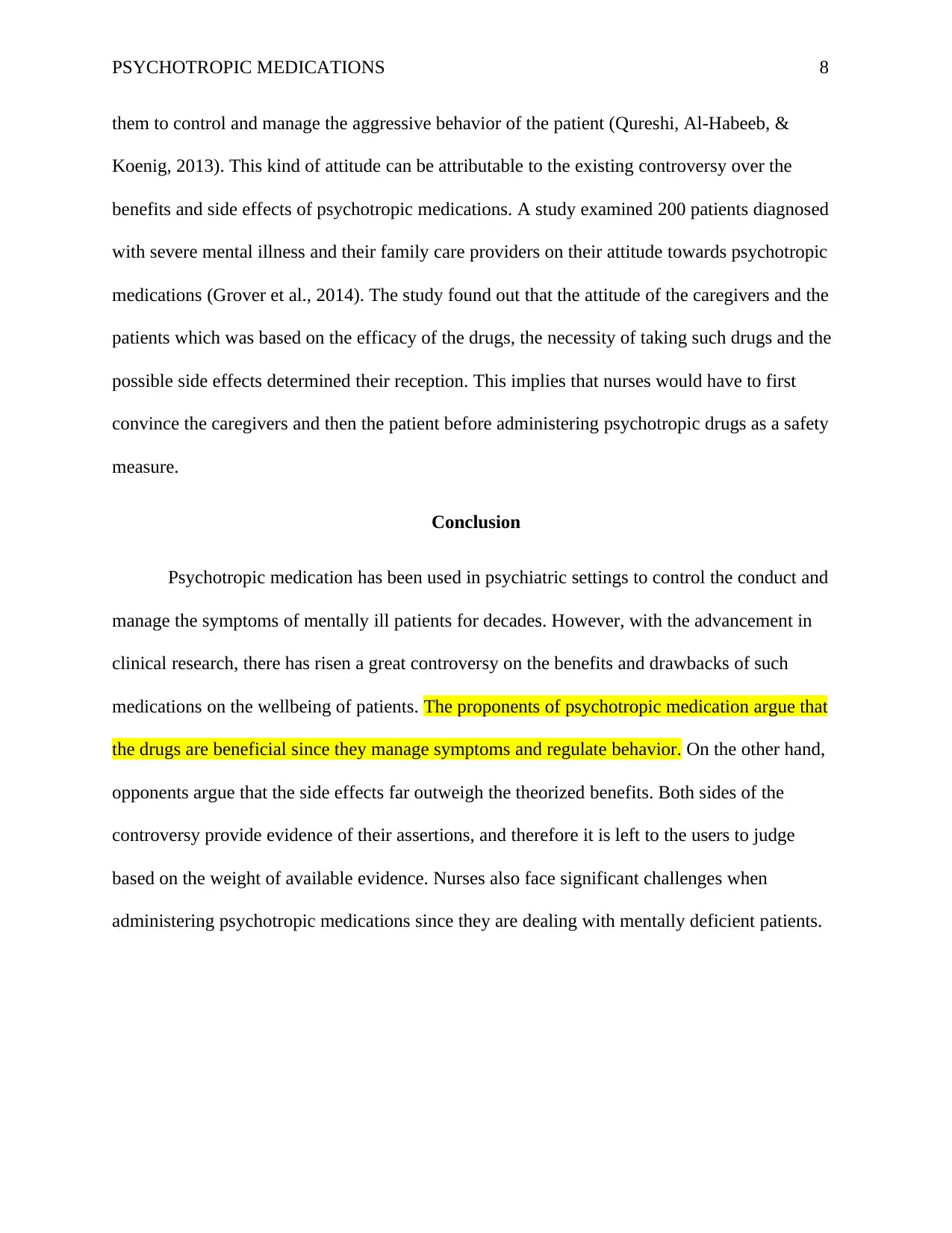
PSYCHOTROPIC MEDICATIONS 8
them to control and manage the aggressive behavior of the patient (Qureshi, Al-Habeeb, &
Koenig, 2013). This kind of attitude can be attributable to the existing controversy over the
benefits and side effects of psychotropic medications. A study examined 200 patients diagnosed
with severe mental illness and their family care providers on their attitude towards psychotropic
medications (Grover et al., 2014). The study found out that the attitude of the caregivers and the
patients which was based on the efficacy of the drugs, the necessity of taking such drugs and the
possible side effects determined their reception. This implies that nurses would have to first
convince the caregivers and then the patient before administering psychotropic drugs as a safety
measure.
Conclusion
Psychotropic medication has been used in psychiatric settings to control the conduct and
manage the symptoms of mentally ill patients for decades. However, with the advancement in
clinical research, there has risen a great controversy on the benefits and drawbacks of such
medications on the wellbeing of patients. The proponents of psychotropic medication argue that
the drugs are beneficial since they manage symptoms and regulate behavior. On the other hand,
opponents argue that the side effects far outweigh the theorized benefits. Both sides of the
controversy provide evidence of their assertions, and therefore it is left to the users to judge
based on the weight of available evidence. Nurses also face significant challenges when
administering psychotropic medications since they are dealing with mentally deficient patients.
them to control and manage the aggressive behavior of the patient (Qureshi, Al-Habeeb, &
Koenig, 2013). This kind of attitude can be attributable to the existing controversy over the
benefits and side effects of psychotropic medications. A study examined 200 patients diagnosed
with severe mental illness and their family care providers on their attitude towards psychotropic
medications (Grover et al., 2014). The study found out that the attitude of the caregivers and the
patients which was based on the efficacy of the drugs, the necessity of taking such drugs and the
possible side effects determined their reception. This implies that nurses would have to first
convince the caregivers and then the patient before administering psychotropic drugs as a safety
measure.
Conclusion
Psychotropic medication has been used in psychiatric settings to control the conduct and
manage the symptoms of mentally ill patients for decades. However, with the advancement in
clinical research, there has risen a great controversy on the benefits and drawbacks of such
medications on the wellbeing of patients. The proponents of psychotropic medication argue that
the drugs are beneficial since they manage symptoms and regulate behavior. On the other hand,
opponents argue that the side effects far outweigh the theorized benefits. Both sides of the
controversy provide evidence of their assertions, and therefore it is left to the users to judge
based on the weight of available evidence. Nurses also face significant challenges when
administering psychotropic medications since they are dealing with mentally deficient patients.
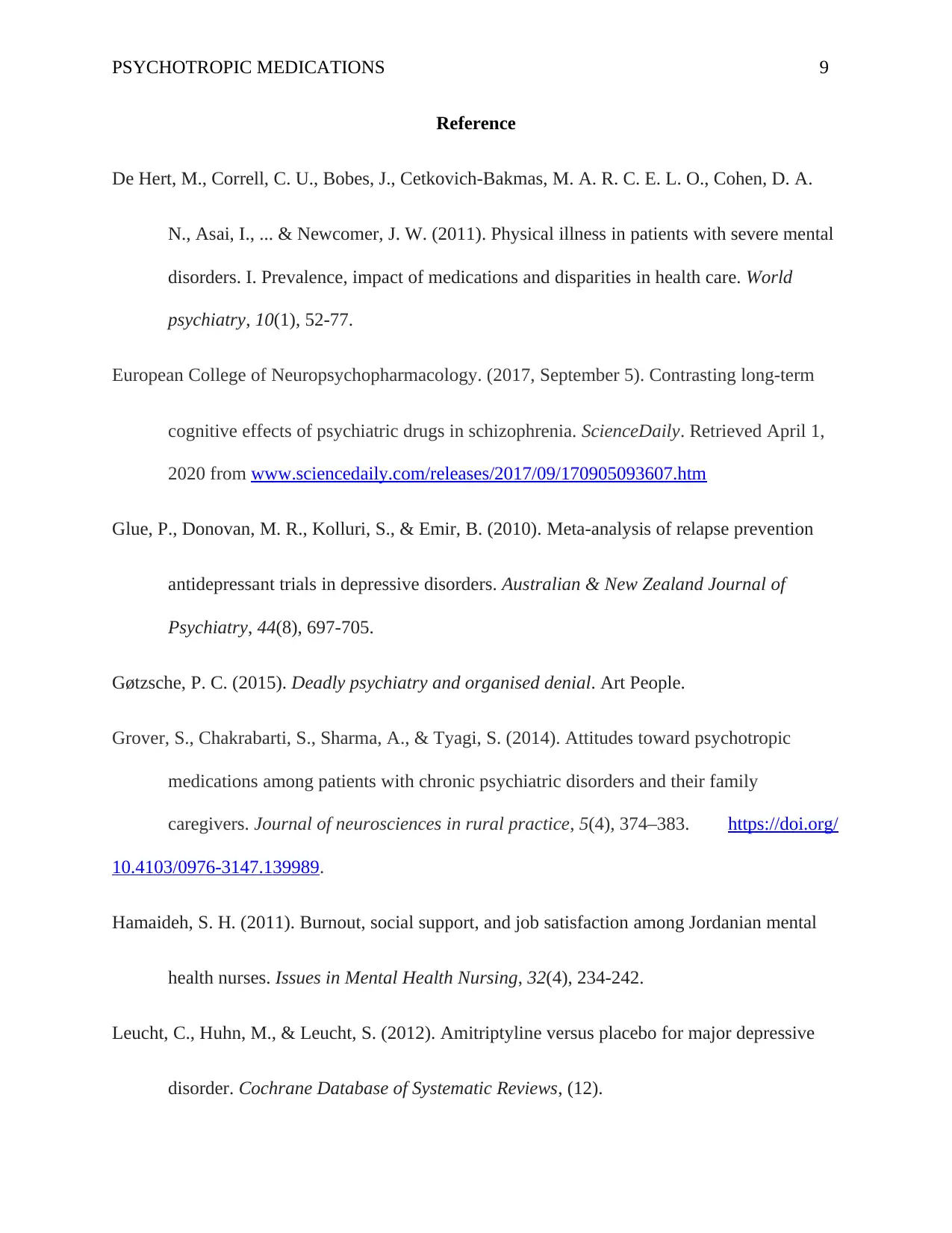
PSYCHOTROPIC MEDICATIONS 9
Reference
De Hert, M., Correll, C. U., Bobes, J., Cetkovich‐Bakmas, M. A. R. C. E. L. O., Cohen, D. A.
N., Asai, I., ... & Newcomer, J. W. (2011). Physical illness in patients with severe mental
disorders. I. Prevalence, impact of medications and disparities in health care. World
psychiatry, 10(1), 52-77.
European College of Neuropsychopharmacology. (2017, September 5). Contrasting long-term
cognitive effects of psychiatric drugs in schizophrenia. ScienceDaily. Retrieved April 1,
2020 from www.sciencedaily.com/releases/2017/09/170905093607.htm
Glue, P., Donovan, M. R., Kolluri, S., & Emir, B. (2010). Meta-analysis of relapse prevention
antidepressant trials in depressive disorders. Australian & New Zealand Journal of
Psychiatry, 44(8), 697-705.
Gøtzsche, P. C. (2015). Deadly psychiatry and organised denial. Art People.
Grover, S., Chakrabarti, S., Sharma, A., & Tyagi, S. (2014). Attitudes toward psychotropic
medications among patients with chronic psychiatric disorders and their family
caregivers. Journal of neurosciences in rural practice, 5(4), 374–383. https://doi.org/
10.4103/0976-3147.139989.
Hamaideh, S. H. (2011). Burnout, social support, and job satisfaction among Jordanian mental
health nurses. Issues in Mental Health Nursing, 32(4), 234-242.
Leucht, C., Huhn, M., & Leucht, S. (2012). Amitriptyline versus placebo for major depressive
disorder. Cochrane Database of Systematic Reviews, (12).
Reference
De Hert, M., Correll, C. U., Bobes, J., Cetkovich‐Bakmas, M. A. R. C. E. L. O., Cohen, D. A.
N., Asai, I., ... & Newcomer, J. W. (2011). Physical illness in patients with severe mental
disorders. I. Prevalence, impact of medications and disparities in health care. World
psychiatry, 10(1), 52-77.
European College of Neuropsychopharmacology. (2017, September 5). Contrasting long-term
cognitive effects of psychiatric drugs in schizophrenia. ScienceDaily. Retrieved April 1,
2020 from www.sciencedaily.com/releases/2017/09/170905093607.htm
Glue, P., Donovan, M. R., Kolluri, S., & Emir, B. (2010). Meta-analysis of relapse prevention
antidepressant trials in depressive disorders. Australian & New Zealand Journal of
Psychiatry, 44(8), 697-705.
Gøtzsche, P. C. (2015). Deadly psychiatry and organised denial. Art People.
Grover, S., Chakrabarti, S., Sharma, A., & Tyagi, S. (2014). Attitudes toward psychotropic
medications among patients with chronic psychiatric disorders and their family
caregivers. Journal of neurosciences in rural practice, 5(4), 374–383. https://doi.org/
10.4103/0976-3147.139989.
Hamaideh, S. H. (2011). Burnout, social support, and job satisfaction among Jordanian mental
health nurses. Issues in Mental Health Nursing, 32(4), 234-242.
Leucht, C., Huhn, M., & Leucht, S. (2012). Amitriptyline versus placebo for major depressive
disorder. Cochrane Database of Systematic Reviews, (12).
⊘ This is a preview!⊘
Do you want full access?
Subscribe today to unlock all pages.

Trusted by 1+ million students worldwide
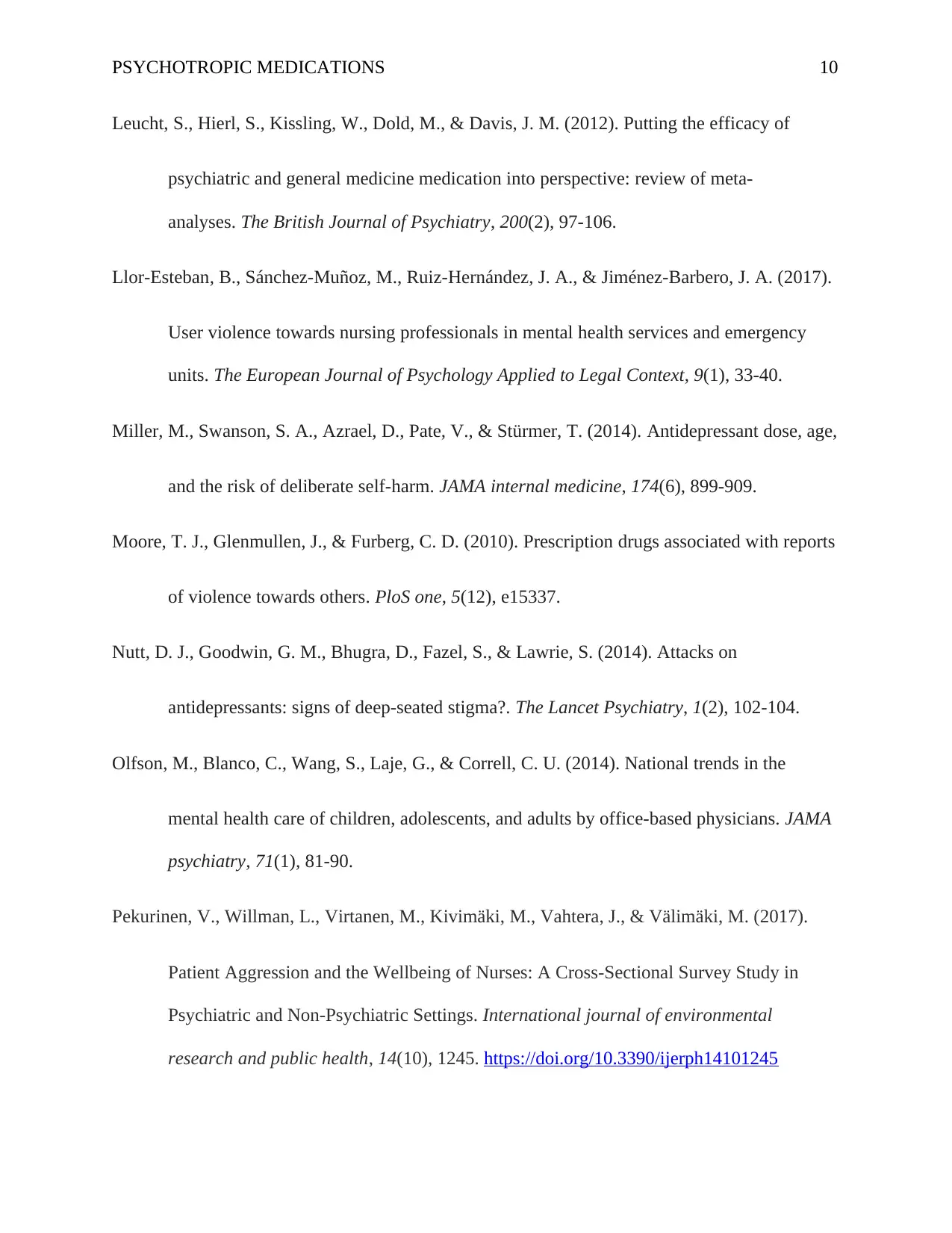
PSYCHOTROPIC MEDICATIONS 10
Leucht, S., Hierl, S., Kissling, W., Dold, M., & Davis, J. M. (2012). Putting the efficacy of
psychiatric and general medicine medication into perspective: review of meta-
analyses. The British Journal of Psychiatry, 200(2), 97-106.
Llor-Esteban, B., Sánchez-Muñoz, M., Ruiz-Hernández, J. A., & Jiménez-Barbero, J. A. (2017).
User violence towards nursing professionals in mental health services and emergency
units. The European Journal of Psychology Applied to Legal Context, 9(1), 33-40.
Miller, M., Swanson, S. A., Azrael, D., Pate, V., & Stürmer, T. (2014). Antidepressant dose, age,
and the risk of deliberate self-harm. JAMA internal medicine, 174(6), 899-909.
Moore, T. J., Glenmullen, J., & Furberg, C. D. (2010). Prescription drugs associated with reports
of violence towards others. PloS one, 5(12), e15337.
Nutt, D. J., Goodwin, G. M., Bhugra, D., Fazel, S., & Lawrie, S. (2014). Attacks on
antidepressants: signs of deep-seated stigma?. The Lancet Psychiatry, 1(2), 102-104.
Olfson, M., Blanco, C., Wang, S., Laje, G., & Correll, C. U. (2014). National trends in the
mental health care of children, adolescents, and adults by office-based physicians. JAMA
psychiatry, 71(1), 81-90.
Pekurinen, V., Willman, L., Virtanen, M., Kivimäki, M., Vahtera, J., & Välimäki, M. (2017).
Patient Aggression and the Wellbeing of Nurses: A Cross-Sectional Survey Study in
Psychiatric and Non-Psychiatric Settings. International journal of environmental
research and public health, 14(10), 1245. https://doi.org/10.3390/ijerph14101245
Leucht, S., Hierl, S., Kissling, W., Dold, M., & Davis, J. M. (2012). Putting the efficacy of
psychiatric and general medicine medication into perspective: review of meta-
analyses. The British Journal of Psychiatry, 200(2), 97-106.
Llor-Esteban, B., Sánchez-Muñoz, M., Ruiz-Hernández, J. A., & Jiménez-Barbero, J. A. (2017).
User violence towards nursing professionals in mental health services and emergency
units. The European Journal of Psychology Applied to Legal Context, 9(1), 33-40.
Miller, M., Swanson, S. A., Azrael, D., Pate, V., & Stürmer, T. (2014). Antidepressant dose, age,
and the risk of deliberate self-harm. JAMA internal medicine, 174(6), 899-909.
Moore, T. J., Glenmullen, J., & Furberg, C. D. (2010). Prescription drugs associated with reports
of violence towards others. PloS one, 5(12), e15337.
Nutt, D. J., Goodwin, G. M., Bhugra, D., Fazel, S., & Lawrie, S. (2014). Attacks on
antidepressants: signs of deep-seated stigma?. The Lancet Psychiatry, 1(2), 102-104.
Olfson, M., Blanco, C., Wang, S., Laje, G., & Correll, C. U. (2014). National trends in the
mental health care of children, adolescents, and adults by office-based physicians. JAMA
psychiatry, 71(1), 81-90.
Pekurinen, V., Willman, L., Virtanen, M., Kivimäki, M., Vahtera, J., & Välimäki, M. (2017).
Patient Aggression and the Wellbeing of Nurses: A Cross-Sectional Survey Study in
Psychiatric and Non-Psychiatric Settings. International journal of environmental
research and public health, 14(10), 1245. https://doi.org/10.3390/ijerph14101245
Paraphrase This Document
Need a fresh take? Get an instant paraphrase of this document with our AI Paraphraser
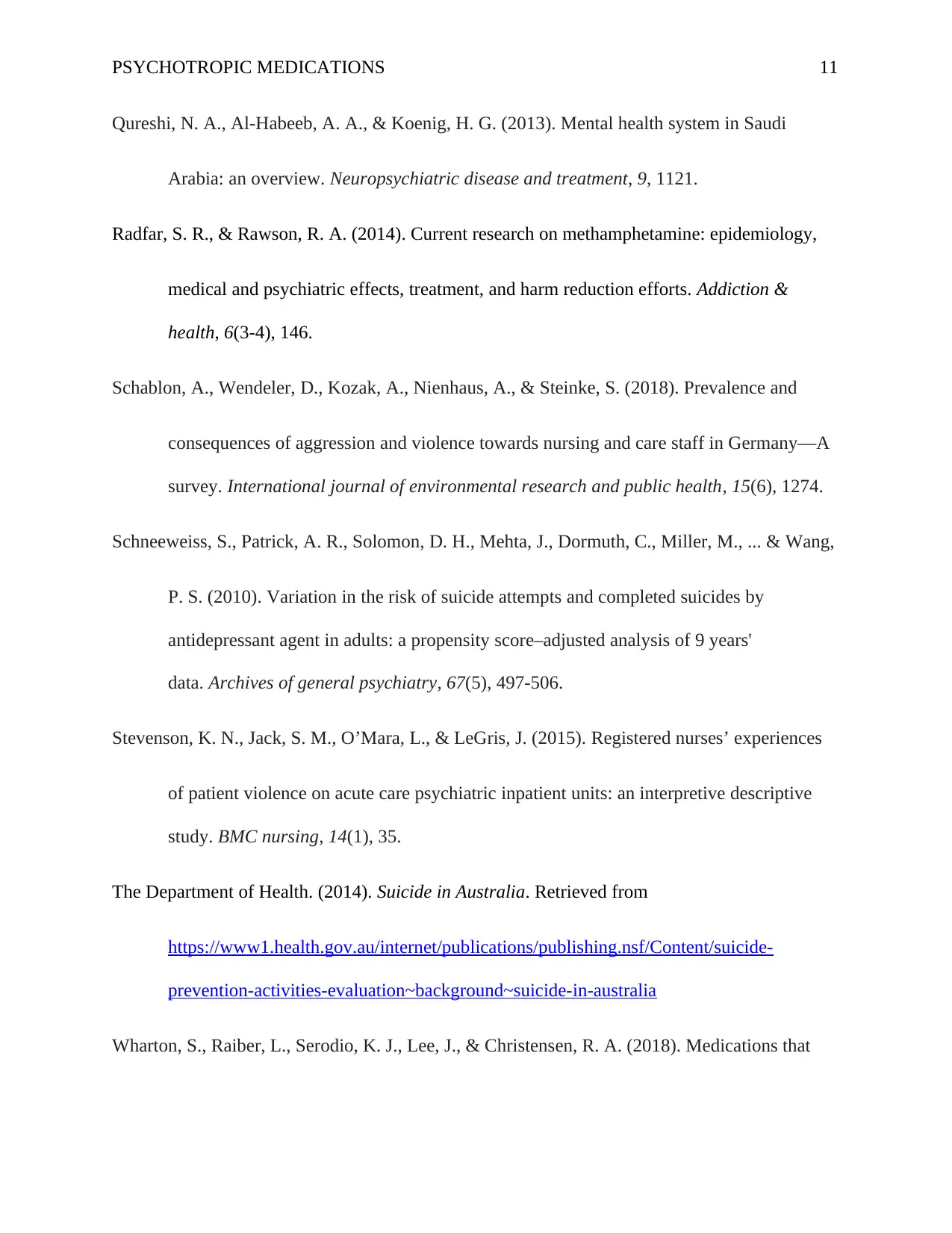
PSYCHOTROPIC MEDICATIONS 11
Qureshi, N. A., Al-Habeeb, A. A., & Koenig, H. G. (2013). Mental health system in Saudi
Arabia: an overview. Neuropsychiatric disease and treatment, 9, 1121.
Radfar, S. R., & Rawson, R. A. (2014). Current research on methamphetamine: epidemiology,
medical and psychiatric effects, treatment, and harm reduction efforts. Addiction &
health, 6(3-4), 146.
Schablon, A., Wendeler, D., Kozak, A., Nienhaus, A., & Steinke, S. (2018). Prevalence and
consequences of aggression and violence towards nursing and care staff in Germany—A
survey. International journal of environmental research and public health, 15(6), 1274.
Schneeweiss, S., Patrick, A. R., Solomon, D. H., Mehta, J., Dormuth, C., Miller, M., ... & Wang,
P. S. (2010). Variation in the risk of suicide attempts and completed suicides by
antidepressant agent in adults: a propensity score–adjusted analysis of 9 years'
data. Archives of general psychiatry, 67(5), 497-506.
Stevenson, K. N., Jack, S. M., O’Mara, L., & LeGris, J. (2015). Registered nurses’ experiences
of patient violence on acute care psychiatric inpatient units: an interpretive descriptive
study. BMC nursing, 14(1), 35.
The Department of Health. (2014). Suicide in Australia. Retrieved from
https://www1.health.gov.au/internet/publications/publishing.nsf/Content/suicide-
prevention-activities-evaluation~background~suicide-in-australia
Wharton, S., Raiber, L., Serodio, K. J., Lee, J., & Christensen, R. A. (2018). Medications that
Qureshi, N. A., Al-Habeeb, A. A., & Koenig, H. G. (2013). Mental health system in Saudi
Arabia: an overview. Neuropsychiatric disease and treatment, 9, 1121.
Radfar, S. R., & Rawson, R. A. (2014). Current research on methamphetamine: epidemiology,
medical and psychiatric effects, treatment, and harm reduction efforts. Addiction &
health, 6(3-4), 146.
Schablon, A., Wendeler, D., Kozak, A., Nienhaus, A., & Steinke, S. (2018). Prevalence and
consequences of aggression and violence towards nursing and care staff in Germany—A
survey. International journal of environmental research and public health, 15(6), 1274.
Schneeweiss, S., Patrick, A. R., Solomon, D. H., Mehta, J., Dormuth, C., Miller, M., ... & Wang,
P. S. (2010). Variation in the risk of suicide attempts and completed suicides by
antidepressant agent in adults: a propensity score–adjusted analysis of 9 years'
data. Archives of general psychiatry, 67(5), 497-506.
Stevenson, K. N., Jack, S. M., O’Mara, L., & LeGris, J. (2015). Registered nurses’ experiences
of patient violence on acute care psychiatric inpatient units: an interpretive descriptive
study. BMC nursing, 14(1), 35.
The Department of Health. (2014). Suicide in Australia. Retrieved from
https://www1.health.gov.au/internet/publications/publishing.nsf/Content/suicide-
prevention-activities-evaluation~background~suicide-in-australia
Wharton, S., Raiber, L., Serodio, K. J., Lee, J., & Christensen, R. A. (2018). Medications that

PSYCHOTROPIC MEDICATIONS 12
cause weight gain and alternatives in Canada: a narrative review. Diabetes, metabolic
syndrome and obesity: targets and therapy, 11, 427.
cause weight gain and alternatives in Canada: a narrative review. Diabetes, metabolic
syndrome and obesity: targets and therapy, 11, 427.
⊘ This is a preview!⊘
Do you want full access?
Subscribe today to unlock all pages.

Trusted by 1+ million students worldwide
1 out of 12
Related Documents
Your All-in-One AI-Powered Toolkit for Academic Success.
+13062052269
info@desklib.com
Available 24*7 on WhatsApp / Email
![[object Object]](/_next/static/media/star-bottom.7253800d.svg)
Unlock your academic potential
Copyright © 2020–2026 A2Z Services. All Rights Reserved. Developed and managed by ZUCOL.





